How Long Does Brie Cheese Last?
When you buy through our links, The Breslin may earn an affiliate commission. Learn more
“How long does Brie cheese last?” is one of the hot topics on many discussion forums about cuisine. Indeed, Brie cheese has its magic to captivate anyone out there, even at the first bite.
Many recipes, from informal to luxurious ones, require Brie as a must-have ingredient. Not to mention, Brie cheese is also a nutritious treat, France’s delicacy, and a tribute to French royalty. All somewhat explains Brie’s reputation.
Brie’s high cost, along with a short shelf-life, makes Brie storage vital. Lucky you, this post will offer you well-rounded knowledge about ways to store it efficiently. All steps are pretty simple to follow up.
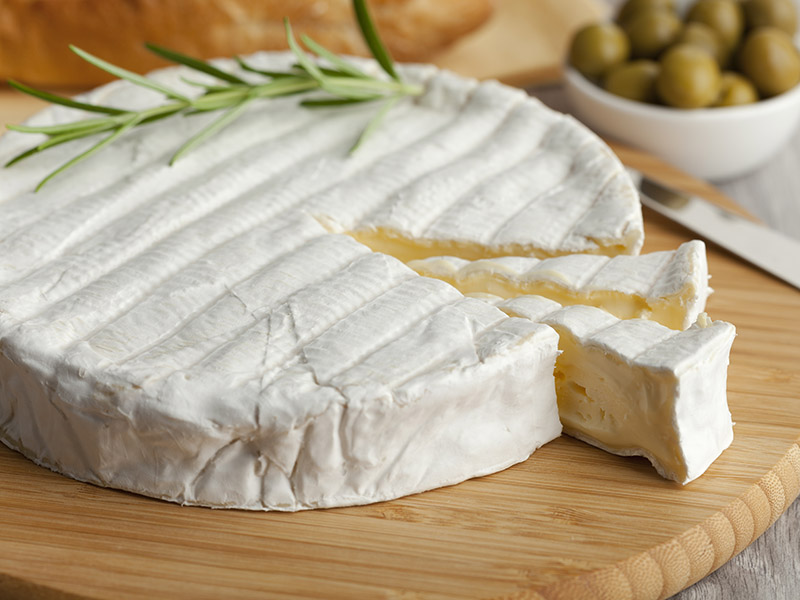
What Is Brie Cheese?
Brie cheese is a white-mold-covered and soft-ripened cheese originating from France. Now, it has become wide-reaching in many countries and regions worldwide.
Brie belongs to the same family of cheese as Camembert. That said, there are many aspects that differ Camebert from Brie cheese. For example, the latter often has a high milk fat percentage than the former.
Thanks to Brie cheese exquisite flavor, this unpasteurized cow milk product gained its title “King Of Cheeses” (English) and “Le Roi Des Fromages” (French) a long time ago.
Brie’s rich dairy content, distinct flavor, peculiar making process, and health benefits are always hot threads on multiple media platforms. Notably, the Penicillium used in Brie production contributes much to brushing up Brie’s reputation worldwide.(1)
The white mold rind and an earthy, mild, buttery flavor make Brie a sought-after ingredient in many recipes. It comes with a unique creamy and runny texture that not many Brie cheese alternatives can replicate.
Brie cheese goes well with bread, crackers, fruits, and a wide range of wine or champagnes.
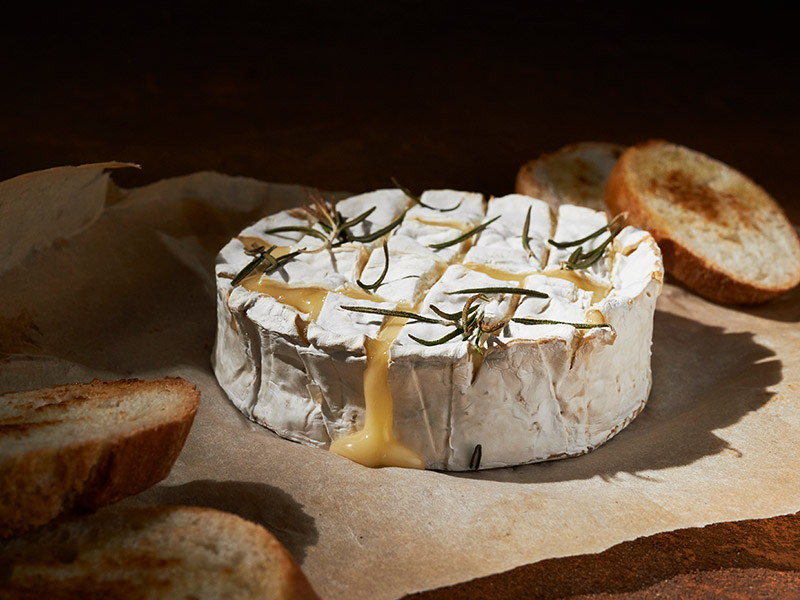
How Long Does Brie Cheese Last?
Have a closer look at the table below for an all-rounded view on Brie’s shelf-life in some storage conditions:
Take note that unopened vs. opened Brie cheese don’t have many differences in lifespan. An unopened Brie can ripen as an opened one does.
Nonetheless, opened cheeses always tend to degrade in quality quicker, showing most clearly in the refrigerating condition. Hence, you’d better consume opened Brie cheese sooner than its unopened counterpart to be on the safe side.
At Room Temperature
Brie cheese tastes best at room temperature. Both unopened and opened Brie cheese will stay fresh for about 4 hours in the open, depending on the sizes and types of cheese.
After this time, it becomes softer and less tasteful gradually. That’s why you need to transfer fresh Brie into the fridge soon after opening its package or consuming it quickly.
Of note, soft cheese’s moisture level is pretty high, which develops bacteria easily. To this end, refrigerate remaining soft cheese promptly after use.

In The Fridge
As mentioned above, you should store Brie cheese in a fridge soon after eating. After serving, the leftovers always need refrigerating to minimize their spoiling speed.
It’s best to consume your refrigerated Brie cheese in 1 – 2 weeks after opening for the best taste. Although the cheese will remain safe to eat after that time period.
Meanwhile, unopened ones’ shelf-life is up to 1 – 2 months as their packages will retain their quality in the fridge better.
In The Freezer
If you believe that a freezer does the trick for the most extended lifespan of Brie, you’re right. The “best-by” of frozen Brie cheese can be up for 6 months (both unopened and opened).
As Brie cheese has a short shelf-life and quickly spoils, storage is irreplaceable to keep it fresh longer. Frozen Brie needs thawing in the fridge after moving out of the freezer.
However, frozen Brie may lose its flavor and become somewhat crumbly. If quality is your highest concern, you should not freeze soft cheese since freezing affects the soft Brie’s texture and flavor.
Frozen and thawed Brie cheese isn’t the best choice for sandwiches or as a side dish. Yet, if you plan on cooking frozen cheese for dishes like stews or casseroles, it’s quite fine.
In brief, freezing and defrosting Brie can’t maintain its intact, and thus affects your dishes more or less.

How To Store Brie Cheese Properly
The party’s over, and it’s time to store all leftover Brie cheese. Give your precious cheese the good care it deserves.

In The Fridge
Like other cheeses, the fridge is always an excellent option to store Brie cheese.
The fresh Brie needs to be transferred into the fridge right after opening the package and consuming it. Its shelf-life is so short at room temperature, as stated above.
Both unopened and opened Brie will stay best in the fridge’s back or vegetable drawer owing to its stable temperature and moisture. Some refrigerators include a dedicated cheese draw, which is inarguably your number one choice.
Unopened ones just need to be refrigerated with their original packaging. On the flip side, opened ones require proper wrapping. You can use parchment, wax paper, or the packaging paper that it comes with to wrap your cheese.
You can add an extra layer of plastic film to maximize the cheese shelf life. However, don’t let the Brie touch the plastic directly as it can impart unpleasant aromas to Brie and develop mold inside.
In The Freezer
I will dive into each part: how to freeze unopened and opened Brie cheese and how to thaw them.
Unopened Brie Cheese
It’s fantastic if you still have an unopened Brie cheese package. Original packaging will protect the Brie’s taste and form. To freeze, place Brie cheese securely in a sealed container or plastic bag prior to freezing it.
Opened Brie Cheese
Airtight wax or parchment paper wrapping is essential to store opened Brie in the freezer. This prevents moisture from infiltrating and retaining Brie’s flavors.
For the whole cheese, aluminum foil is recommended to wrap Brie. Put the wrapped cheese into the freezer bag and push out the air before sealing it shut. Finally, arrange everything in the freezer. It takes a couple of hours for the whole cheese to become solid.
If you want to freeze individual slices, make sure to wrap them tightly with cheese paper or parchment paper. Doing this hinders them from being exposed to cold air and drying out.
Afterwards, move all wrapped pieces into a freezer bag, push out the excess air inside and seal the bag. It’s better to note details and dates on the bag to keep track of the expiration date. Finally, freeze all Brie.
Thaw Brie Cheese
When craving some delicious soft cheese, take the Brie out of the freezer and thaw it overnight in the fridge. A whole cheese requires a full night of defrosting, while thin slices need only one hour.
Brie for melting doesn’t need to thaw. Just throw frozen Brie into a pot or put it on the toast. Keep track of the cooking time to melt Brie properly.
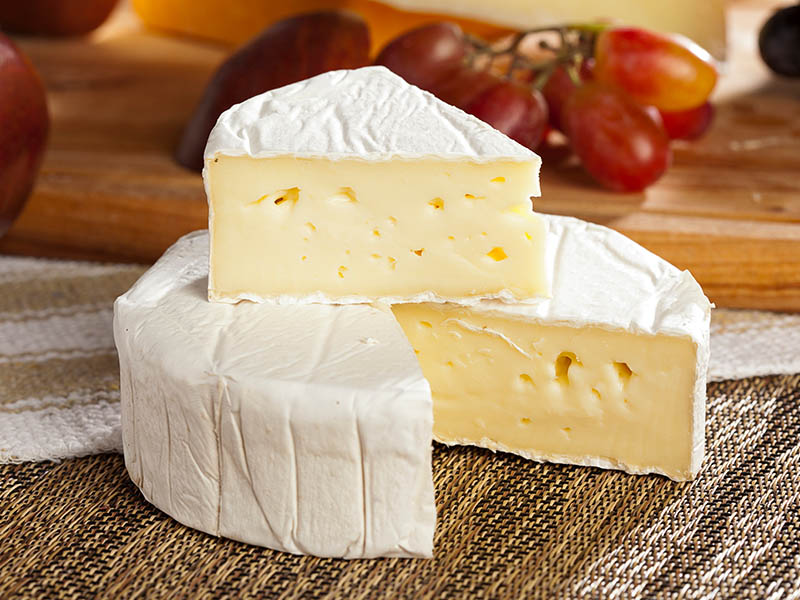
Other Handy Tips
Here are some extra tips to maximize your precious Brie cheese’s shelf life and keep its flavor fresh.
- The fridge’s best temperature for storing Brie cheese ranges from 38 to 45 degrees F.
- The wax or parchment paper should be at least three times the Brie’s size.
- Double wrapping the cheese in wax paper preserves Brie’s aroma and refrains Brie from tainting other foods nearby.
- It’s better if you wrap the cheeses tightly in either wax paper or parchment paper before refrigerating and freezing. This way retains Brie’s flavors better.
- The length of time you can keep cheese varies case by case; the thicker and larger the Brie cheese, the longer it can last. Therefore, the storing time may vary based on the Brie variation.
How To Know That Brie Cheese Is Spoiled
There are several signs indicating your Brie cheese is going down, showing most clearly through colors, flavor, and smells. Let’s have a glimpse of them.
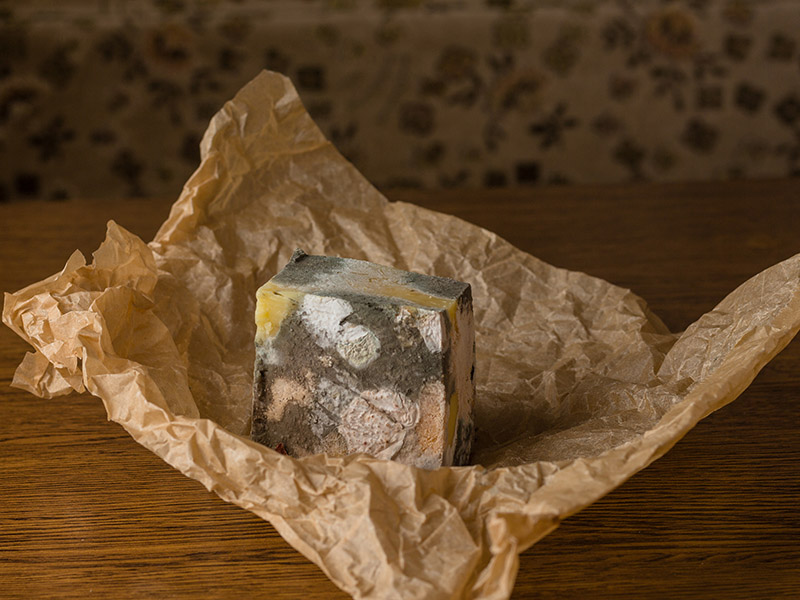
Mold And Discoloration
It’s usual if Brie’s surface has a white film with some dark spots when it aged. Still, different colors like blue, green, or pink is a sign that mold has infected your cheese. And you might as well toss your Brie cheese out of the refrigerator at once.
Additionally, when the Brie’s rind looks brittle and gray, it’s near the expiration date. Don’t consume Brie with these symptoms, or you can be at risk of food poisoning.
Bizzare Smell
Fresh Brie has a milky, buttery, mildly sweet, and earthy flavor. Once it ages, it will emit an ammonia smell, but this is normal.
Let the cheese “breath” out in the open for a few minutes, then check its smell again. If the smell is mild and the Brie’s texture is creamy, it’s still edible. However, you should discard Brie if the sour smell is too strong.
Out-of-date Brie has a strong ammonia or rotten odor which makes many shy away. It’s a sure sign of inedible cheese.
Overpowering Taste
Another situation when you should consider getting rid of your Brie cheese is when it has aged for a little too long. Although the cheese is still technically edible, the interior might have turned gooey and has an overpowering smell.
Plus, you probably won’t enjoy the flavor due to how intense it has become. Consuming such cheese might also upset your stomach.
All in all, expired Brie cheese needs discarding at once. Consuming expired Brie will cause serious health issues and diseases.
Click here to know more about spoiled symptoms on Brie cheese.
Outstanding Brie Cheese Recipes For Your Menu
I bet these Brie cheese recipes will “wow” you once you try them. Stay tuned to go for incredible dishes with Brie.
1. Baked Cranberry & Brie Bites
No wonder Baked Cranberry & Brie Bites are top-notch in Brie Cheese Recipes. Its flakey and gooey texture and delectable taste will blow your mind in seconds.
You will never get enough of this outstanding taste. A dish is also a great option for holiday celebrations and feasts.
Get inside this video to grasp a step-by-step guide on how to make it!
2. Brie Mac and Cheese
Brie Mac and Cheese is a classic dish captivating all Brie-cheese lovers worldwide. Its taste is creamy and rich, making your dining table luxurious. Its magic can get a glow-up on any upcoming occasion. Give your beloved ones this kind of dish to rock their world.
It’s time to prepare Brie Mac and Cheese for your dining table!
3. Maple Pecan Baked Brie
The melty Brie topped with pecan, brown sugar, and maple goes well with graham crackers and apple slices. Don’t hesitate to add it to your Brie cheese board. Beyond that, little fruits like grapes and strawberries also make things more fabulous.
Lastly, a bottle of dry white wine can’t lack the dish’s greatness.
Go for the recipe for Maple Pecan Baked Brie!
Best Brie Cheese To Purchase
Your meals play a crucial role in boosting energy and nutrition for your body. High-end Brie cheese products are irreplaceable for your qualified dishes. It’s time to get inside 3 products that I highly recommend using:
1. Président Soft-Ripened Brie Cheese
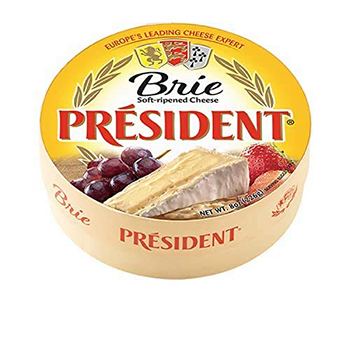
Président holds its no.1 position in producing Brie cheese. No wonder Président Brie from 100% cow’s milk is a staple at any get-together. The jaw-dropping creamy and soft texture of Brie will make your day.
Beyond that, the product excels in delivering the best flavor and texture. Be wise to pair it with bread or fruits or bake it for a warm snack.
2. Excellence Creamy Brie Cheese
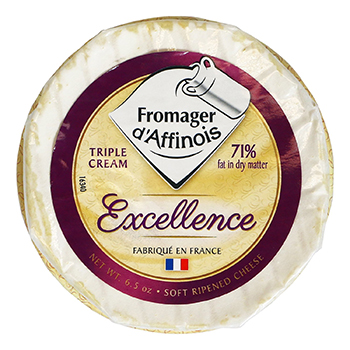
Excellence Creamy Brie Cheese is a cow-milk and gluten-free cheese. The creamy and butter aroma makes it delectable and enticing.
Let’s chill out with this Brie cheese and pair it with mixed dried fruits, snacks, and crackers. Especially its yogurt-like and tart flavor makes it awe-inspiring and exciting.
3. French Cheese Brie De Meaux
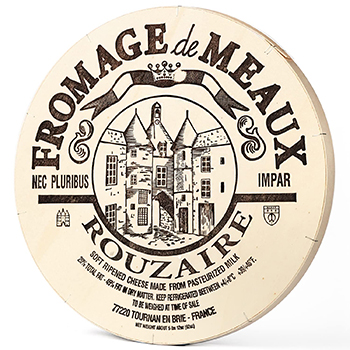
Give it a go for Brie de Meaux, whose name derives from the town of Meaux, France. This raw cow-milk cheese is formed based on the injection with Penicillium Candidum molds.
Brie De Meaux is well-received as one of the best cheeses in France, with a yummy creamy texture. The aged cheese creates a subtle nutty and buttery taste from almonds, mushrooms, and truffles. It goes well with a red Bordeaux, Burgundy, or Champagne.
FAQs
Now that I’ve unveiled some of the vital details of Brie cheese’s shelf-life and adequate storage. It’s time to go for some extra questions. Have a quick look!
The Wiser You Keep Brie Cheese, The Better!
Fresh Brie cheese will enhance your meals’ seductiveness. And on top of that, its nutrition value is a gift to your health. That said, knowing “how long does Brie cheese last” and “how to keep Brie stay fresh” is necessary.
Now is your time to prepare the delectable dishes with Brie cheese with your fellas. Don’t forget to drop some comments for further discussions and share this post with anyone needing it.
References:
- Wikipedia.org, (2022). Penicillium.
- Mayoclinic.org, (2020). If Cheese Has Mold Growing On It, Should I Throw It Away?

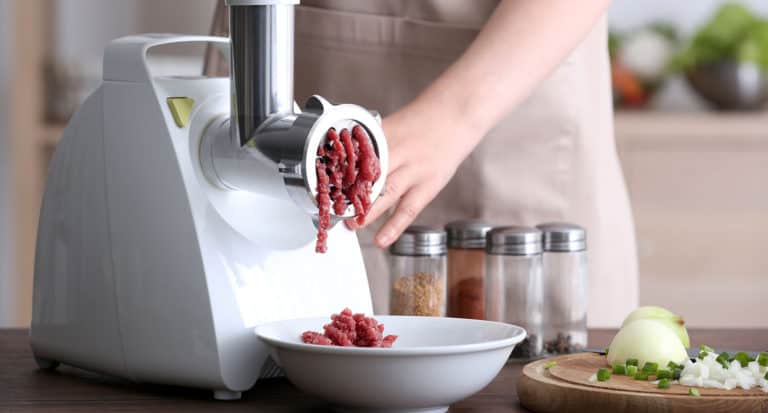


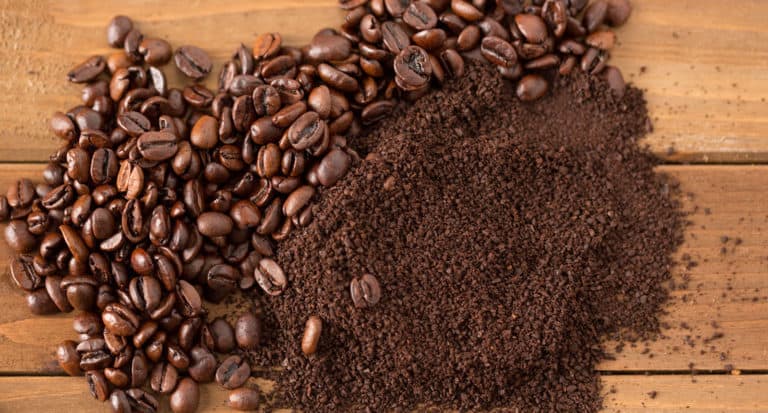


Amanda Collins
Founder and Senior Culinary Editor
Expertise
Culinary Arts and Management, Food Journalism and Critique, Recipe Development and Testing, Global Culinary Traditions, Sustainable Food Practices
Education
Institute of Culinary Education (ICE), New York, NY
Program: Diploma in Culinary Arts
Focus: Intensive hands-on training in culinary techniques, recipe development, and kitchen management, preparing students for professional roles in the culinary industry.
Monroe College, New Rochelle, NY
Program: Associate in Applied Science in Culinary Arts
Focus: Practical culinary skills, including cooking techniques, menu planning, and kitchen operations, with an emphasis on hands-on experience and industry standards.
Amanda Collins is a seasoned chef and food editor with a deep love for global flavors. Trained at the Institute of Culinary Education and Monroe College, and with over 15 years in the culinary field, Amanda has refined her skills in kitchens worldwide. Her background in food studies gives her a unique ability to share both recipes and the cultural stories that shape them.
As senior culinary editor at thebreslin.com, Amanda’s work brings authentic dishes to life, inviting readers to explore new flavors and techniques from around the globe. Her approachable style makes it easy for anyone to bring a bit of the world’s cuisine into their kitchen.